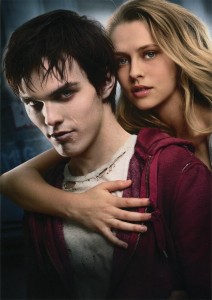Blog Archives
Happy Zom-pocalypse!
I had an awesome birthday party with friends and family at the archery range (Australia has a lot of gun laws, and bows are quieter) and then watched the extended (and original) Dawn of the Dead.

Allison and I got a bullseye at the same time!
And of course, I got a lot of zombie related presents! Or book vouchers, which I turned into zombie related presents. So even if reading about my birthday is boring, here’s a list of the books I’ve gotten.
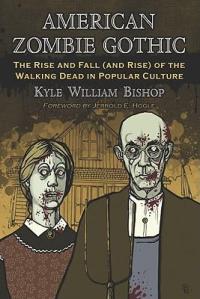
Kyle William Bishop has written a huge amount of intelligent and insightful zombie articles, and this book is one I’ve been dying to get for ages. He is very well referenced in a lot of other articles and theses. This book goes through the entire evolution of the zombie from it’s start in voodoo, and of course, throughout the Romero era. In particular, I’ve been looking forward to a chapter called ‘Humanizing the Living Dead’.

Fred Botting is a staple of any gothic or horror related article or thesis. He wrote the hugely referenced book The Gothic in 1996, but I chose this one as it was published in 2010 and relates to horror and science fiction with looks into cyberspace, posthuman machines and inhuman technology. I might end up getting The Gothic as well, but this one was on sale.
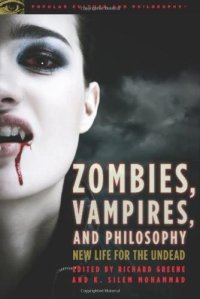
Considering the influences of vampires on zombie lore (e.g. the use of bite = infection/change, and famously, I am Legend was a huge influence on Romero and is often confused for a zombie novel), this looks awesome. Reading academic reviews of it, it isn’t the most in-depth or detailed, particularly for those who are highly read in the subjects already, but considering I’m just starting out my research, it will be useful.
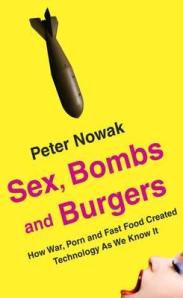
A non-zombie book! *le gasp* I’m hoping that this book will be helpful in establishing cultural and societal anxieties, and how humanity adapted. This will also be related to another thesis idea I have (with science fiction texts) and hope to explore in a masters or doctors thesis. I do absolutely love (and am very amused at) how much the sex industry contributes to technology.

Now for fiction! Dust looks fascinating, as it’s one of the few books which looks at zombies from the zombies point of view (also seen in Warm Bodies, or Life as a White Trash Zombie). This looks at life as a posthuman, and while humans are scared of zombies, what is it that can scare the monster? One of the biggest problems with zombies is that they are really hard to make into sympathetic characters (but it can be done!), so I’m looking forward to seeing how Turner deals with this.

This just looks fantastic to me. Society has devolved back to Victorian customs (love the clothing!) and while there are evil zombies, there are SAS-like squads of good zombies. One thing that drives me nuts about fantasy is that so many reviewers relate every fantasy back to Tolkien (even if they’ve never read Tolkien … ><), and what makes me start foaming at the mouth about zom-rom is that people who don’t know better just say it’s a rip off of Twilight. I’ve already ranted about this before, but in looking at reviews of this book, I saw the same thing again. That’s more a problem with the whole Cult of the Amateur. For me, I can’t wait to read this!
What makes a zombie a zombie?
Upon my recent viewing, what I’m finding very interesting is the great changes in zombie behaviour over the decades since Night of the Living Dead. Human behaviour is much the same, but zombies change (adapt? evolve?) to cater to the new audiences.
Here are some of the general differences (of course, won’t be true for absolutely every movie):
- Speed: Early zombies are shamblers, but don’t be fooled, they are just as dangerous as the fast zombies. Never, ever underestimate them.
- Hunger: The whole brains thing comes from Return of the Living Dead, a horror comedy. Zombies in film are attracted to flesh, but there’s a scene where an early zombie is seen eating bark off a tree.
- Reason for being: Suddenly, a wild zombie appears! Or was it a chemical leak? A bio-engineered disease? Early films don’t explain how or why the zombie comes about. That’s one thing that used to grate on me in books because I enjoy the backstory of why. But sometimes it’s just irrelevant.
- Mindlessness: Earlier zombs could scream in pain, use tools, bust out lights, pull out phone cords. In Dawn of the Dead (original), one survivor makes the remark that the reason zombs are going to the mall is because it was an important place in their lives, they go there out of habit. Most modern zombs don’t have any of this. No memory, no emotion. Just the urge to feed upon flesh. (There are a few exceptions to this, of course). In Return of the Living Dead, they could even talk.
- Special zombies: These are not present in Night/Dawn. Tarman in Return of the Living Dead could just be Patient Zero rather than a special. Some modern zomb films and stories have the different types, the most common special being a Tank or Behemoth. A big one. Might be a bit smarter, might be able to use tools where others can’t. Left 4 Dead has a variety of specials, including a Tank, but also a Witch, Hunter, Jockey, Spitter, Charger, Boomer (fan art at the bottom pictures a Witch and a Hunter … they don’t kiss in the game, but I find it fascinating how somehow, fan fictioners/artists have come up with the idea to make those two in particular lovers). What makes these ones ‘turn special’ is unknown, but they are clearly separate from the other mindless hordes.
- The long undead: This is from Return of the Living Dead, where the long dead awaken. This is quite a rare thing in zomb texts, but an interesting distinction nonetheless. This also relates to the infection and how/why of the zombs.
- Infection: Through bite or exposure
- Desire to eat humans (whatever the body part)
- Ignorant of injury to itself (will keep coming after you despite a shot in the leg)
- Lesser mindedness/single mindedness: Their focus is on eating, not manners. While most have lesser capabilities, there are some texts where they seem to remember their lives
- Rot/Decay: Crumbling bodies are a regular appearance in zomb texts. As the story goes on from Night to Dawn to Day of the Dead, the makeup gets more gruesome and rotted.
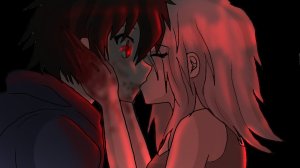
Left 4 Dead witch hunter 2 by !angelofhapiness3 on deviantART
The Other
“For there to be an ‘us’… there has to be a ‘not-us’”
Edward W Said, quoted in Science Fiction and Empire by Patricia Kerslake
As my delightful colleagues said in reference to my first post, the Other is not unique to zombies. You could almost say it exists in every text.
Without the outsider, we cannot define what we are. We need an alien, a foreigner, a stranger, a zombie. Something that we can relate to enough to feel for them, whether envious of their technology, fearful of their brain nomming, or disdained for their lack of civilisation. They are enough like us that we can sympathise, depending on how the text bends. Through the Other can we see ourselves. A reflection of what was, may yet be, or what could have been. Peter Barry, in a chapter on Post-Colonial Critique in Beginning Theory writes “states of marginality, plurality and perceived Otherness are seen as sources of energy and potential change”.
Zombies are an unlikely candidate for sympathy. Cannibalistic, animalistic, and just gross, they shamble across our screens and pages with no distinction or honour between them. There are texts however that seek to change this, just as with any other Other. Something I’m considering is whether the loving zombie is just as zombie as the murderous zombie. Whether it is defined by what it is called. Both are undead, are still beings that were raised or arose from the ground after bodily death. Is the vampire still a vampire, even if it sparkles? (I wouldn’t ask Anne Rice that!)
Are zombies a catalyst for humanity to pick itself up from the petty bickering of currency and politics, and once again prove itself as the dominant species? Or are zombies a chance for humanity to open its arms to something new and strange, yet not so different?
A very good looking zombie : Warm Bodies
